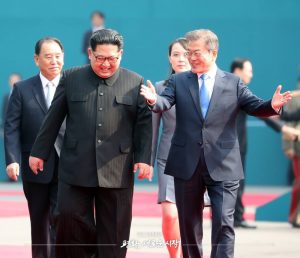The Korean Central News Agency (KCNA), North Korea’s state media, reported on Friday that the North’s supreme leader Kim Jong Un exchanged letters with South Korean President Moon Jae-in this week. Amid rising tensions on the Korean Peninsula and the critical statements toward Seoul’s defense minister published by Kim Yo Jong, the powerful sister of Kim Jong Un, weeks ago, the exchange of letters between the two leaders was unexpected. It’s likely to be the last such exchange, as Moon’s term ends on May 9.
In the letter sent on Wednesday, Moon expressed “the will to make the North-South joint declarations the foundation for the reunification” even after he leaves office, according to KCNA.
In a reply to Moon’s letter, Kim expressed his gratitude toward “the pains and effort taken by Moon Jae In for the great cause of the nation until the last days of his term of office,” KCNA said.
In a series of historical summit meetings in 2018 at Panmunjom and Pyongyang, Moon and Kim announced joint declarations to make a peaceful Korean Peninsula by taking substantive efforts for the denuclearization of the Korean Peninsula, a declaration of the end of the Korean War, and phased disarmament.
However, since the Hanoi talks between then-U.S. President Donald Trump and Kim failed to reach an agreement in 2019, the joint declarations between the two Koreas brought no lasting results. Pyongyang has restarted developing and testing missiles while demanding that Seoul and Washington remove their “hostile policies,” which generally indicates the crippling economic sanctions against the North and the joint South Korea-U.S. military drills.
Pyongyang already conducted its 12th missile test this year, including test-launches of its Hwasong-15 intercontinental ballistic missile (ICBM), hypersonic missiles, and a new guided tactical weapon. Under Kim’s five-year military modernization plan introduced in the Eighth Congress of the Korean Workers’ Party last year, more missile tests will come this year. More specifically, Pyongyang will likely focus on expanding its nuclear deterrent by conducting a nuclear test and developing a list of weapons including miniaturized nuclear warheads, tactical nuclear weapons, and solid-fuel ballistic missiles.
The arms race on the Korean Peninsula seems certain to intensify in coming years based on expected changes in Seoul’s policy toward North Korea starting on May 10, when President-elect Yoon Suk-yeol will be inaugurated. Moon’s letter might indicate his hope to serve as a special envoy on North Korea during Yoon’s term. However, as Yoon once called Moon’s policies on North Korea “submissive,” inter-Korean relations are unlikely to warm up in his term. Yoon is instead expected emphasize strengthening the self-capabilities of South Korea while developing ties with the U.S – which would be North Korea’s pretext for more missile tests.

































